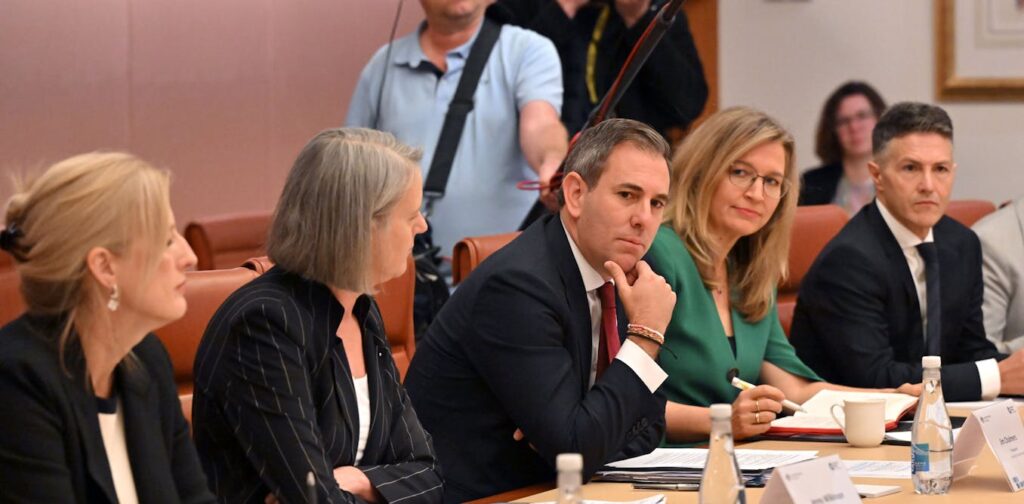
As Treasurer Jim Chalmers navigated his economic reform roundtable, his colleague Mark Butler, Minister for the National Disability Insurance Scheme (NDIS), made a significant announcement on Wednesday. Butler revealed that the government aims to restrict the NDIS cost growth to 4–6% annually, a move that is both ambitious in policy terms and politically robust.
This announcement follows the groundwork laid by Butler’s predecessor, Bill Shorten, during Labor’s first term. Shorten’s reforms sought to contain the cost increase to 8% annually, down from about 22% a few years ago. Currently, the growth rate stands at around 10%. Butler’s reforms propose transitioning children with developmental delays and mild autism to alternative treatments outside the NDIS.
Strategic Timing and Political Implications
The timing of Butler’s announcement was strategic, coinciding with the roundtable’s session on budget sustainability. The latest reform is not only financially necessary but also makes practical sense. As Butler pointed out,
“Most Australians would be alarmed to know that one out of every ten six-year-olds are in the NDIS, including 16% of six-year-old boys.”
Even an 8% growth rate would have been unsustainable in budgetary terms.
So far, the reaction has been limited, with Victorian Premier Jacinta Allan expressing concern over not being forewarned. Politically, the government has cover; the opposition, often critical of Labor’s spending, would find it hypocritical to oppose this push for savings.
Challenges in Implementation
The success of Butler’s reforms will hinge on effective delivery. The changes, while building on Shorten’s efforts, require states to take on a larger role in service provision. Previous attempts encountered resistance from state governments. The announcement was strategically made just before the roundtable’s discussion on budget sustainability, underscoring its importance.
Butler has not provided an estimate of the potential savings, but the reforms are expected to save the budget billions in the medium term. The roundtable, which concluded late Thursday, has equipped the government with a set of measures to implement soon and a “permission” to pursue others later.
Taxation and Regulatory Reforms
One of the most significant outcomes of the roundtable was the discussion on taxation. Summarizing the meeting, Chalmers noted an appetite for tax reform on three fronts:
- Ensuring a “fair go” for working people, including intergenerational equity
- Incentivizing business investment affordably
- Simplifying and sustaining the system to fund essential services, considering aging and other economic pressures
Participants expressed a willingness to collaborate with the government in these areas, although there will be no comprehensive, independent tax inquiry. Chalmers has skillfully garnered support for advancing tax priorities without having sought a mandate for them during the election.
The roundtable also endorsed a variety of regulatory simplifications, aiming for “quick wins” such as accelerating the Environment Protection and Biodiversity Conservation (EPBC) legislation and reducing complexity in the National Construction Code. A new road user charge received strong backing, although details remain forthcoming.
Artificial Intelligence and Future Prospects
On the topic of artificial intelligence, the roundtable brought participants closer together, though consensus was not reached. The government will decide whether existing legislation suffices or if a new overarching bill is necessary after further analysis.
Chalmers emerged from the roundtable optimistic about the potential for progress. Holding the meeting privately, yet allowing participants to discuss proceedings publicly, struck a balance that minimized performative behavior while fostering candid dialogue.
Chalmers’ leadership was praised, and the roundtable provided an opportunity for participants to gain insight into his views and style. Danielle Wood, chair of the Productivity Commission, was notably recognized for her role in preparing multiple reports and delivering a compelling speech at the National Press Club.
Reflections on Reform Under the Albanese Government
This week’s events have illuminated the Albanese government’s approach to reform. The NDIS plan demonstrates that a strong parliamentary mandate can inspire political courage. Had the government been re-elected with a smaller margin, it might have hesitated to tackle the NDIS so decisively.
In contrast, Chalmers’ roundtable exemplified inclusive incrementalism. By engaging in dialogue and discarding unfeasible ideas, the government has managed to advance its agenda. Critics may argue that the big issues remain unaddressed, but Chalmers has adeptly framed incremental progress as a positive narrative.
As one observer quipped, the roundtable produced not “a big shiny box” but “a laundry basket of things” that require further refinement. These initiatives will need to be developed in the coming days, months, and budgets, with the basket replenished as new opportunities arise.






